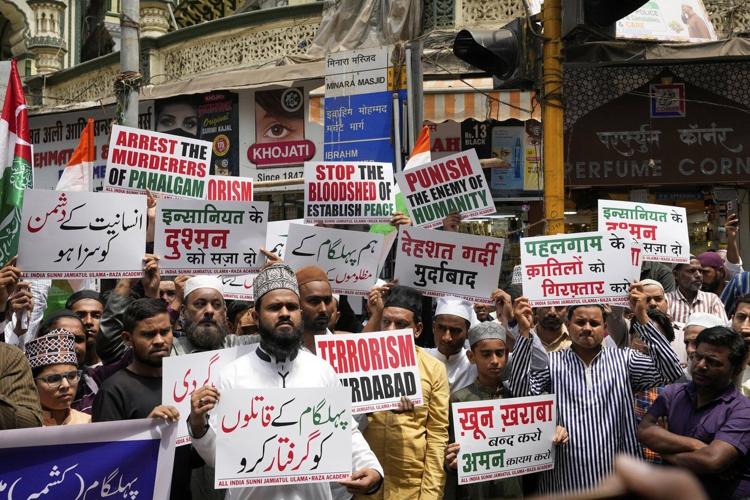NEW DELHI (AP) ŌĆö India and Pakistan have intensified their hostilities over the hotly contested Kashmir region following a massacre of 26 mostly Indian tourists, which New Delhi linked to Pakistan.
Pakistan denies it was behind Tuesday’s attack by gunmen on a group of tourists in Kashmir. Both sides have since escalated the tensions by exchanging diplomatic and trade sanctions against each other and raising fears of a military conflict.
Indian and Pakistani soldiers briefly exchanged fire along their highly militarized frontier in the disputed Himalayan region of Kashmir, Indian officials said Friday, as tensions soared between the nuclear-armed rivals following a deadly attack on tourists. (AP Video / April 25, 2025)
Here are five reasons why between India and Pakistan matters:
The Kashmir attack can lead to an armed conflict between two neighbors
Under intense domestic pressure, India has hinted at the possibility of a limited military strike on Pakistan in response to what it called the ŌĆ£terror attackŌĆØ with ŌĆ£cross-border links.ŌĆØ Pakistan made it clear that it will respond militarily to an attack.
This raises fears that an escalation by any one side can lead to a wider war. The last time the two nations came to blows was in 2019, when killed 40 Indian soldiers in Kashmir.
In 2021, the sides renewed a ceasefire agreement along their border, which has largely held. That relative calm was broken on Thursday after a
Kashmir is a nuclear flashpoint between the archrivals
Both India and Pakistan are armed with nuclear weapons. There are fears that any conventional war or skirmish between them could potentially turn into a nuclear exchange.
India and Pakistan have fought two major wars, in 1965 and 1971, but in 1974, India conducted its first nuclear tests, raising the stakes in any military conflict. It triggered a nuclear race and Pakistan reached that same milestone in 1998.
Since then, India and Pakistan have had one major border skirmish in 1999 that killed at least 1,000 combatants. The fighting only stopped after U.S. intervened.
Indian and Pakistani nationals attempted to head back to their home countries on Friday, as both sides revoked all visas issued to each other's nationals with hostilities intensifying following a massacre of 26 mostly Indian tourists in the hotly contested Kashmir region, which New Delhi linked to Pakistan. (AP Video / April 25, 2025)
A conflict could drag in China
India and China are geopolitical rivals whose along the disputed Himalayan border in 2020. Ties between the Asian giants have improved since but they still maintain large numbers of troops on their borders. Their borders are also contiguous to Pakistan’s, making it the worldŌĆÖs only three-way nuclear junction.
Beijing also controls a part of the Kashmir region that New Delhi says belongs to India.
On the other hand, and has helped advance its missile programs, creating additional military concerns for New Delhi. Meanwhile, India maintains strong defense ties with the U.S., which has long sought to limit BeijingŌĆÖs rise in the Indo-Pacific region.
Experts say any conflict between India and Pakistan is unlikely to stay strictly between them, as their strategic partners are likely to get involved.
Kashmir tensions can lead to a war over water
In response to the massacre, India suspended a crucial treaty that governs the flow of river waters into Pakistan. Pakistan said it would consider any attempt to stop the flow of water from India an ŌĆ£act of war.”
Under the Indus Water treaty, India is obliged to let six rivers flow freely to Pakistan. If India follows through and restricts the flow, it can have a devastating impact on Pakistan’s agriculture as it battles acute water shortages.
It’s also also a major environmental issue. Water insecurity is a big concern in both India and Pakistan due to rapidly growing populations and climate change.
Attacks by militants and rights abuses in Kashmir test world’s response
Rights groups ŌĆö including the U.N. ŌĆö have blamed New Delhi for rights violations including civilian killings and arbitrary arrests in Indian-controlled Kashmir as a result of an intense crackdown by Indian forces. It has hurt India’s human rights record and raised concerns that global powers are not doing enough to pressure New Delhi and hold it accountable.
Militants fighting against Indian rule have also killed scores of civilians, including Hindu pilgrims.
India has used military response against militants as part of its efforts to eradicate ŌĆ£terrorism,” saying it threatens regional stability.


































